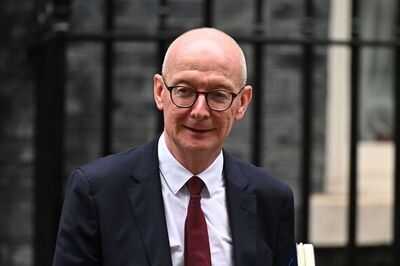Sick note Britain is costing the nation £212billion every year - and the cost will continue rising as more working-age people say they are too ill to hold down a job. The cost to the benefits bill is set to increase by £20billion over the next five years, and young people are particularly affected - with 436,000 people aged 16-34 now saying they cannot work due to a mental health condition.
The warnings are set out in a report from the Department for Work and Pensions (DWP), which said: "The UK is sliding into an economic inactivity crisis." The Government said it would work with employers and mayor-led regional authorities to help keep staff in work. Work and Pensions Secretary Pat McFadden said: "Keeping people healthy and in work is the right thing to do and is essential for economic growth.
"Business is our partner in building a productive workforce, because when businesses retain talent and reduce workplace ill-health, everyone wins."
An inquiry by former John Lewis chairman Sir Andrew Mayfield, commissioned by the DWP, warned that 2.8million working-age people have dropped out of the workforce, meaning they are not in work or looking for a job, due to health conditions. This is 800,000 more than in 2019. But the number is expected to soar by another 600,000 by 2030.
The costs to the UK are already huge, and include £132billion in lost economic output from people too sick to work, and another £37billion in lost output from unpaid carers looking after the sick.
Proposed changes include reform of the "fit note" system, in which GPs, nurses or pharmacists provide a note to say an employee is too ill to work. These are typically provided after a 10-minute GP consultation, of which two minutes are spent discussing and signing the fit note, the inquiry said.
Sir Charles said other countries "do much better".
He said: "There is broad recognition that Britain is facing a quiet but urgent crisis. Over one in five working-age adults are out of the workforce, substantially because of health problems. Mental ill-health among young people is rising sharply. Older workers are leaving too early."
The Government said more than 60 employers - including the British Beer and Pub Association, Burger King, John Lewis and Google UK - have expressed interest in becoming so-called vanguard employers to pioneer the overall new approach.
This would involve a three-year phase focused on how to address mental health at work, retention of older people in work and improved participation and retention of disabled people in work.
James Watson-O'Neill, from national disability charity Sense, said he welcomed plans for employers to offer staff more support but warned against slashing benefits. He said: "Cutting welfare benefits will only add to financial insecurity and anxiety, making it even harder for people to focus on finding or keeping a job."
You may also like

WPGT: Vani drops two late bogeys, shares lead with Shagun and Jahanvi

Congress leader Nitin Raut files complaint against BJP leader Ashish Shelar for making "divisive" remarks on voter list

BJP's new state committee in West Bengal might be announced by end of next week

SIR exercise: Over 30 lakh enumeration forms distributed across Rajasthan in 2 days

'Cup of tea' in Kabul proved costly: Pakistan's Ishaq Dar calls it a mistake; pledges not to repeat it







